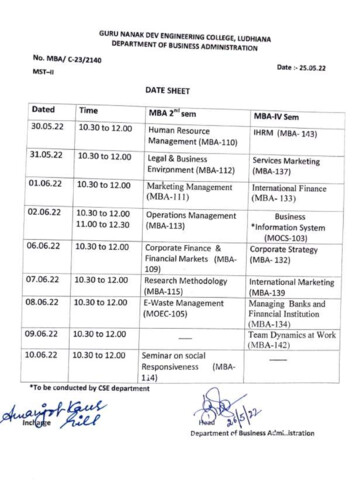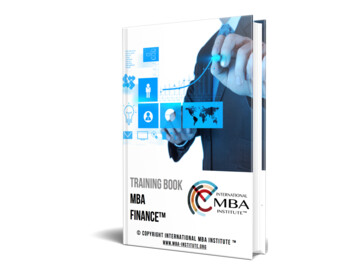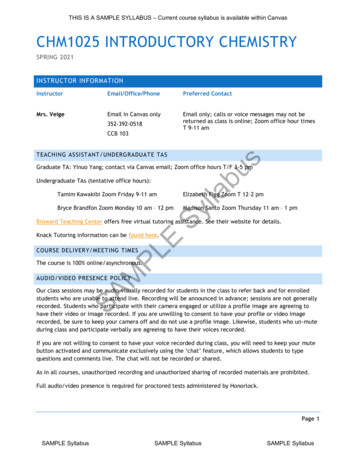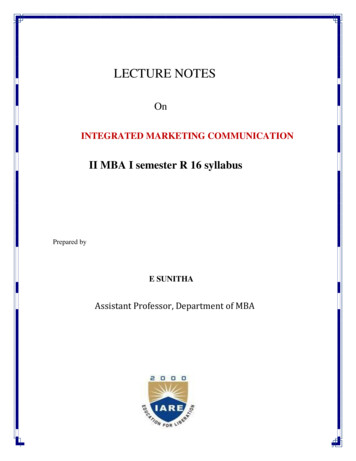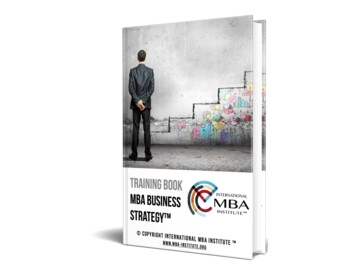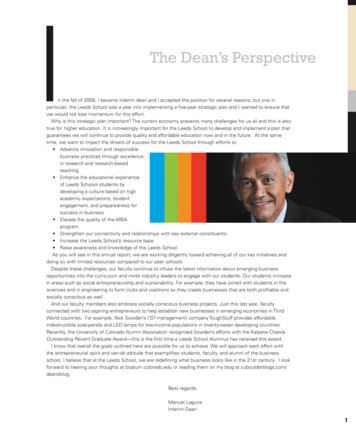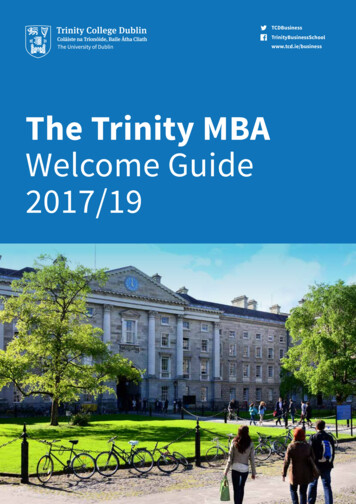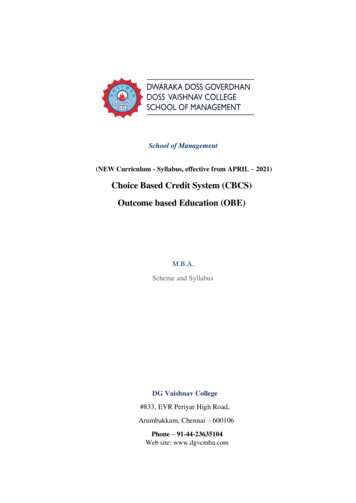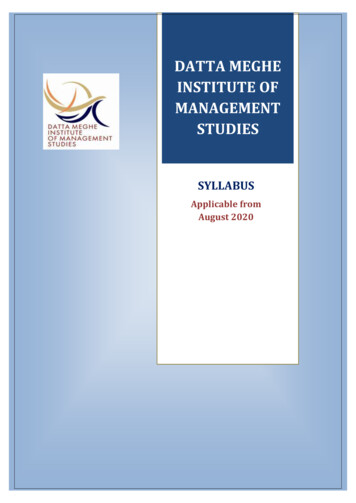
Transcription
DATTA MEGHEINSTITUTE OFMANAGEMENTSTUDIESSYLLABUSApplicable fromAugust 2020
Nagar YuvakShikshanSanstha’sDatta Meghe Institute of Management StudiesAtrey Layout, Nagpur--- 440 022Autonomous Institute Affiliated to Rashtrasant Tukadoji Maharaj Nagpur UniversitySOE 2020 ONWARDSMAXMINMAXMIN24006018 10050C2102 Skills in Accounting400044006018 10050C2103 Quantitative Techniques400044006018 10050C2104 Managerial Economics300034006018 10050C2105 Organisational Behaviour300034006018 10050C2106 Legal Aspects of Business300034006018 10050C2107 Business Ethics200024006018 10050S2108 Business Communication200024006018 1005004024006018 10050CORESEMESTER –ISKILLS2109 IT (MS Office)TOTALNumber of credits ofthe course0302230 040 25Note: Evaluation PatternMSE-1MSE-2UNIT 1 UNIT 2UNIT 1UNIT 3 UNIT 4UNIT 2360540-900ESEALL UNITSALL UNITS1 PageDean, AcademicsDirectorMINCredits0MAXPractical HoursTotal MarksWrittenExaminationTutorial HoursInternalAssessmentInstruction Hours0COURSE CODE20COURSE TYPESEMESTERC2101 Principles of ManagementCOURSE Title-
Nagar YuvakShikshanSanstha’sDatta Meghe Institute of Management StudiesAtrey Layout, Nagpur--- 440 022Autonomous Institute Affiliated to Rashtrasant Tukadoji Maharaj Nagpur UniversitySEMESTER IIMAXMINMAXMIN4006018 10050300034006018 10050400044006018 10050300034006018 10050300034006018 10050C2206 Human Resource Management300034006018 10050C2207 Environment Management200024006018 10050C2208 Financial Management400044006018 10050---C2202 Research MethodologyC2203Cost Control & ManagementaccountingC2204 Entrepreneurial DevelopmentCORESEMESTER –IIC2205Production & OperationsManagementS2209 SWAYAM/NPTELA22101Employability80Enhancement Programme (EEP)A2211 Basics of ExcelTOTAL00250 0---40----40 26 320 - 480 162 800A210/A211 - Audit CoursesA student who fails to complete the EEP (Employability EnhancementProgramme) /Basics of EXCEL course will be denoted with G grade to show thatthe course is incomplete.2 PageDean, AcademicsMINCredits3Fundamentals of MarketingManagementMAXPractical HoursTotal MarksWrittenExaminationTutorial Hours0COURSE TYPESEMESTERInternalAssessmentInstruction Hours0COURSE CODE30C2201COURSE TitleDirector-
Nagar YuvakShikshanSanstha’sDatta Meghe Institute of Management StudiesAtrey Layout, Nagpur--- 440 022Autonomous Institute Affiliated to Rashtrasant Tukadoji Maharaj Nagpur UniversitySEMESTER IIITotal MarksWrittenExaminationInternalAssessment0 3 40 0 6018 10050SP2302 Specialisation – I : Paper 23000 3 40 0 6018 10050SP2303 Specialisation – I : Paper 33000 3 40 0 6018 10050SP2304 Specialisation – I : Paper 43000 3 40 0 6018 10050SP2301 Specialisation – II : Paper 13000 3 40 0 6018 10050SP2302 Specialisation – II : Paper 23000 3 40 0 6018 10050SP2303 Specialisation – II : Paper 33000 3 40 0 6018 10050SP2304 Specialisation – II : Paper 43000 3 40 0 6018 10050--GROUP-ASEMESTER IIIGROUP-BSummer Internship ProgramTOTAL270 0-MAXCOURSE TYPEFloatingElectiveSIP45031 -50---100501000-Note: SP stands for respective specialization3 PageDean, AcademicsMIN0MAX30MINSP2301 Specialisation – I : Paper 1MAX50MIN18 100CreditsTutorial Hours0 3 40 0 60Floating ElectivePractical HoursInstruction Hours0COURSE CODE30COURSE TitleDirector
Nagar YuvakShikshanSanstha’sDatta Meghe Institute of Management StudiesAtrey Layout, Nagpur--- 440 022Autonomous Institute Affiliated to Rashtrasant Tukadoji Maharaj Nagpur UniversitySEMESTER IVMAXMINMAXMIN4006018 10050SP2405 Specialisation – I : Paper 5300034006018 10050SP2406 Specialisation – I : Paper 6300034006018 10050SP2405 Specialisation – II : Paper 5300034006018 10050SP2406 Specialisation – II : Paper 6300034006018 10050S2402 Advanced Excel00402400601850---5COURSE TYPECORESEMESTER IVP2403Company Analysis/IndustryImmersion Program(IIP)TOTAL15040 22100-100---4 PageDean, AcademicsDirector100MINCredits3MAXPractical Hours0GROUP-BTotal MarksWrittenExaminationTutorial Hours0GROUP-AInternalAssessmentInstruction Hours30COURSE CODEC2401 Strategic ManagementCOURSE Title200100800-
Nagar YuvakShikshanSanstha’sDatta Meghe Institute of Management StudiesAtrey Layout, Nagpur--- 440 022Autonomous Institute Affiliated to Rashtrasant Tukadoji Maharaj Nagpur UniversityCREDIT MATRIXSEMESTERFIRST SEMESTERSECOND SEMESTERTHIRD SEMESTERFOURTH SEMESTERTOTAL CREDITSCREDITS25263122104MARKS900800100080035005 PageDean, AcademicsDirector
Nagar YuvakShikshanSanstha’sDatta Meghe Institute of Management StudiesAtrey Layout, Nagpur--- 440 022Autonomous Institute Affiliated to Rashtrasant Tukadoji Maharaj Nagpur UniversityELECTIVESELECTIVE A - FINANCIAL MANAGEMENTELECTIVE IIIIIIIIIIIIVIVCOURSE NAMEINSURANCE PRINCIPLES AND PRACTICEMANAGEMENT OF FINANCIAL SERVICESCORPORATE TAXATIONCOMMERCIAL BANK MANAGEMENTSTRATEGIC FINANCIAL MANAGEMENTSECURITY ANALYSIS AND PORTFOLIOMANAGEMENTELECTIVE B -HUMAN RESOURCE MANAGEMENTELECTIVE VIIIIIIIIIIIIIVCOURSE NAMETRAINING AND DEVELOPMENTPERFORMANCE MANAGEMENTINDUSTRIAL PSYCHOLOGYSTRATEGIC HRMINDUSTRIAL RELATIONS AND LABORLEGISLATIONSHR ANALYTICSELECTIVE C -MARKETING MANAGEMENTELECTIVE CCOURSE IIIIIVIVCOURSE NAMECONSUMER BEHAVIORSALES & DISTRIBUTION MANAGEMENTMARKETING OF SERVICESINTEGRATED MARKETING COMMUNICATIONDIGITAL MARKETINGRETAIL MANAGEMENT6 PageDean, AcademicsDirector
Nagar YuvakShikshanSanstha’sDatta Meghe Institute of Management StudiesAtrey Layout, Nagpur--- 440 022Autonomous Institute Affiliated to Rashtrasant Tukadoji Maharaj Nagpur UniversityELECTIVE D- OPERATIONS& LOGISTICS MANAGEMENTELECTIVE DCOURSE VO2406IVCOURSE NAMETOTAL QUALITY MANAGEMENTPROJECT MANAGEMENTINVENTORY MANAGEMENTEXPORT TRADE AND DOCUMENTATIONTRANSPORTATION AND DISTRIBUTIONMANAGEMENTDOMESTIC LOGISTICSELECTIVE E- BUSINESS ANALYTICSELECTIVE ECOURSE IIIIIIIIIIIVIVCOURSE NAMEBUSINESS ANALYTICSDATA MINING AND DATA WAREHOUSINGBIG DATA ANALYTICSDATA SCIENCE & ANALYTICSSOCIAL MEDIA ANALYTICSBUSINESS MODELLINGELECTIVE F - HEALTH CARE MANAGEMENTELECTIVE ECOURSE 2405IVHM2406IVCOURSE NAMEHOSPITAL PLANNINGMEDICAL TERMINOLOGY & PROCEDURESHOSPITAL ADMINISTRATIONLAWS RELATED TO HOSPITAL & MEDICALSERVICESMATERIAL MANAGEMENT & INVENTORYCONTROLHEALTH CARE & ADMINISTRATION OF CLINICAL& NON-CLINICAL SERVICES7 PageDean, AcademicsDirector
Nagar YuvakShikshanSanstha’sDatta Meghe Institute of Management StudiesAtrey Layout, Nagpur--- 440 022Autonomous Institute Affiliated to Rashtrasant Tukadoji Maharaj Nagpur UniversitySEM-I8 PageDean, AcademicsDirector
Nagar YuvakShikshanSanstha’sDatta Meghe Institute of Management StudiesAtrey Layout, Nagpur--- 440 022Autonomous Institute Affiliated to Rashtrasant Tukadoji Maharaj Nagpur UniversityC2101: MANAGEMENT dits02SemesterMBA-I SEM-IOffered inODD SEMPedagogyInteractive lecture session with activities & case StandardstudiesSpecificationEvaluationPatternMid SemExam12 12CourseObjectiveCourseOutcomesUnit-26016Mode of StudyClassroomstudy100Management Practices is a comprehensive introductory course on themanagement process from a manager’s perspective, with particular emphasis onthe skills, competencies, techniques and knowledge needed to successfullymanage an organization. After studying this course, students will be able to have aclear understanding of the managerial functions like planning, organizing, staffing,Coordination and controlling1)2)3)4)Unit-1End Sem Teacher’sTotalExamAssessment MarksThreeUnitsStudents will be able to:Apply appropriate management concepts (PO1) (PO5)Analyze and compare various management concepts (PO3)Justify the implication of the management concept for effective functioningof organization.(PO1) (PO3)Construct a practical application of management concepts.(PO1) (PO5)1. Skills required by Manager2. Types of Plans3. Management by Objectives4. Creation of Plan – sector wise using various components of strategic plan5. Presentation of the Plan1.2.3.4.5.Delegation of authorityDecentralisation of authorityImportance of decision makingCase – 1Case – 29 PageDean, AcademicsDirector
Nagar YuvakShikshanSanstha’sDatta Meghe Institute of Management StudiesAtrey Layout, Nagpur--- 440 022Autonomous Institute Affiliated to Rashtrasant Tukadoji Maharaj Nagpur University6. Case - 3What is Control and Why Engage in It?Essentials of control systemLimitations of control system.Controlling system in following situation –a. A train accidentb. Strike in a factoryc. Employee attritiond. Absenteeisme. Indiscipline staffEthical issues in Controlling systemCollage making activity of GREATEST MANAGERS (GLOBAL)1.2.3.4.Unit-3ResourcesSELF STUDYCOMPONENT1. V S P Rao& H Krishna (2009). Management Texts and Cases (Edition). EBPublication.2. S SSherlekar. (2005). Principles of Business Management (Revised edition).Himalaya Publication.3. R N Gupta. (2005). Principles of Management (Revised edition). S. Chand.4. T Ramaswamy. (2008). Principles of Management (Revised edition).Himalaya Publication.5. P C Tripathi& P N Reddy. Principles of Management. (Third Edition). TataMcGraw-Hill.Controlling systems in Various situations(SSC)10 P a g eDean, AcademicsDirector
Nagar YuvakShikshanSanstha’sDatta Meghe Institute of Management StudiesAtrey Layout, Nagpur--- 440 022Autonomous Institute Affiliated to Rashtrasant Tukadoji Maharaj Nagpur UniversityC2102: SKILLS IN sterMBA-I SEM-IOffered inODD SEMPedagogyInteractive lectureproblem nit-1Unit-2Unit-3Unit-4Unit-5withnumerical StandardSpecificationMid Sem End Sem Teacher’sTotal MarksExamExamAssessment12 12CourseObjectivesession6016Mode of StudySix UnitsClassroomstudy100The objective of the subject is to make the students aware of the various aspects ofaccounting. The students will also learn the accounting method of joint stockcompanies, partnerships firms and non-profit organizations.Students will be able to:1. Apply Accounting concepts, conventions, principles and standards in practicalspheres. (PO1)2. Prepare various books of accounts and financial statements.(PO1)3. Analyse the Financial Statementand draw conclusions (PO2)(PO4)4. Justify the maintenance of books of accounts as per the accountingstandards(PO2)(PO4)Introduction - Meaning, Scope and importance of Financial Accounting. FinancialAccounting -concepts and conventions, classification of accounts, Rules andprinciples governing Double Entry Bookkeeping system.Accounting Standards, AS1, AS2, AS4, AS5, AS 7, AS 9, AS 10, AS 11, AS 15, AS 16Accounting Books & Record - Meaning, Preparation of Journal, Ledger, Cash book,Trial balanceFinal Accounts of Joint Stock Company & firm - Final Accounts of Joint StockCompanies – contents and preparation of Trading and Manufacturing, Profit andLoss Account, Profit and Loss Appropriation, Account and Balance sheet withadjustment.Ethical issues in Accounting practices.Depreciation Accounting - Meaning and concept of depreciation, Variousmethods of calculation of depreciation, Preparation of Asset A/c & Depreciation A/cChange in the method of Depreciation , Concept of AS 6, Impairment of Asset (AS28) and its treatment.Interpretation of Financial Statement I: Ratio Analysis Ratio Analysis: Introduction, Meaning of Ratio, Importance of Ratio Analysis;11 P a g eDean, AcademicsDirector
Nagar YuvakShikshanSanstha’sDatta Meghe Institute of Management StudiesAtrey Layout, Nagpur--- 440 022Autonomous Institute Affiliated to Rashtrasant Tukadoji Maharaj Nagpur UniversityUnit-6ResourcesSELF STUDYCOMPONENTNature of Ratio Analysis; Limitations of Ratio Analysis; Classification of Ratios,numerical on various ratios.Interpretation of Financial Statement II:Fund Flow AnalysisMeaning of Fund Flow Statement, Statement of Changes in Working Capital, Fundfrom Operations, Simple numerical on cash flow statement.Cash Flow AnalysisMeaning of Cash Flow Statement, Cash flow from operating activities, Cash flowfrom investing activities, Cash flow from financing activities, numerical problem onCash Flow Statement1. Shukla&Garewal. Advance Accountancy. S Chand Publication2. Dr. P. Periasamy. Financial, Cost and Management Accounting. (2nd Edition).Himalaya Publishing House.3. ChoudharyChopade. Fundamentals of Accountancy.4. Dr. P.C. Tulsian. Accountancy. Taxman PublicationAccounting Conventions(SSC)12 P a g eDean, AcademicsDirector
Nagar YuvakShikshanSanstha’sDatta Meghe Institute of Management StudiesAtrey Layout, Nagpur--- 440 022Autonomous Institute Affiliated to Rashtrasant Tukadoji Maharaj Nagpur UniversityC2103: QUANTITATIVE edits04SemesterMBA-I SEM-IOffered inODD SEMPedagogyInteractive lecture session, numerical problem StandardsolvingSpecificationEvaluationPatternMid SemExam12 12CourseObjectiveCourseOutcomesUnit-1Unit-2End Sem Teacher’sTotalExamAssessment Marks6016Mode of StudySix UnitsClassroomstudyTutorials100To make students identify and diagnose problems and select the appropriatequantitative technique or model for problem solving and decision making and learnto generate optimized results.Students will be able to:1. Apply various quantitative concepts for problem solution. [PO1] [PO2]2. Analyze various quantitative techniques for decision making. [PO2] [PO4]3. Evaluate data using quantitative tools. [PO2]4. Formulate quantitative information to optimize results[PO4] [PO5]Central tendency: Meaning, scope, importance and limitations, applications ofdescriptive and inferential statistics in managerial decision-making. Measures ofCentral tendency: Arithmetic mean, median and mode.Dispersion: Range, Quartile deviation, Mean deviation, Standard deviation,Coefficient of variation, Skewness and Kurtosis.Unit-3Regression: Method of Least Squares, Regression Coefficient, Standard Errors ofEstimate, Uses and properties of regression coefficient.Unit-4Probability: Permutation& Combination, Probability-Definition, basic concepts,events and experiments, random variables, expected value, types of probability.Unit-5Introduction to Linear Programming Problems: Application of Linearprogramming, General statement and assumptions underlying Linear Programming,Formulation of Linear Programming Problems, Graphical method for solution of13 P a g eDean, AcademicsDirector
Nagar YuvakShikshanSanstha’sDatta Meghe Institute of Management StudiesAtrey Layout, Nagpur--- 440 022Autonomous Institute Affiliated to Rashtrasant Tukadoji Maharaj Nagpur UniversityLPP. Unbounded and degenerate solution of LPP.Introduction to Game Theory: Game models, Two persons zero sum games andtheir solution, solution of 2Xn and mX2 games by graphical approach, Solution ofmXn games.Unit-6Time Series Analysis: Meaning, Components and various methods of time seriesanalysis. Trend analysis: Least Square method - Linear and Non- Linear equationsEthical Issues – Data ManipulationResourcesSELF STUDYCOMPONENT1. S. C. Gupta & Dr. V. K. Kapoor. Fundamentals of Mathematical Statistics: AModern Approach. (10th Ed.) Sultan Chand Publication.2. Render, B., Stair Jr., R.M. & Hanna, M.E. (2003). Quantitative Analysis forManagement. (10th. Ed.). Prentice Hall.3. KantiSwarup, P.K. Gupta & Man Mohan, Operation research (4th Ed.), SultanChand Publication.4. N.D. Vohra, Quantitative Techniques in Management: (3rd Ed) , McGraw HillPublicationSimplification (BODMAS Rules)(SSC)14 P a g eDean, AcademicsDirector
Nagar YuvakShikshanSanstha’sDatta Meghe Institute of Management StudiesAtrey Layout, Nagpur--- 440 022Autonomous Institute Affiliated to Rashtrasant Tukadoji Maharaj Nagpur UniversityC2104: MANAGERIAL dits03SemesterMBA-I SEM-IOffered inODD SEMPedagogyInteractive lecture session, numerical problem StandardsolvingSpecificationEvaluationPatternMid Sem End Sem Teacher’sExamExamAssessment12 016TotalMarksMode of StudySix UnitsClassroomstudy100The objective of the subject is to impart knowledge to the students about fundamentalaspects of the economic principles which are necessary in today’s dynamic andcompetitive business world. Further the objective is to acquaint the participants withthe application of the economic principles and techniques which are very useful insolving complex business problems and effective decision making.Students will be able to:1. Apply the basic principles of economics in various spheres of management.[PO1]2. Analyze outcomes by using various micro economic tools and concepts.[PO1][PO2]3. Assess the impact of macroeconomic policies on overall economicdevelopment.[PO2] [PO4]4. Evaluatethe results of micro and macro-economic decisions on differentbusiness parameters. [PO4]Introduction -Introduction to Managerial Economics: Definition, Nature and Scope,Relationship with other areas of management, Production Management, Marketing,Finance and Personnel, Operations research - The role of managerial economist.Objectives of the firm.Demand& Supply Analysis: Demand Analysis, Elasticity of demand, types andsignificance of Elasticity of Demand. Demand estimation – Marketing researchapproaches to demand estimation. Need for forecasting, forecasting techniques. SupplyAnalysis – Supply function, the Law of Supply, Elasticity of Supply. Numerical problemson Demand tionFunction:15 P a g eDean, AcademicsDirectorConcept,
Nagar YuvakShikshanSanstha’sDatta Meghe Institute of Management StudiesAtrey Layout, Nagpur--- 440 022Autonomous Institute Affiliated to Rashtrasant Tukadoji Maharaj Nagpur ionofproductionfunction–CobbDouglasproduction function. Numerical problems on cost analysis.Unit-4Market Structure y,Pricingmethodsin practice: Pricediscrimination.Unit-5Indian Economy: National Income Accounting, Various Methods of calculating NationalIncome, Concept of GDP, GNP, NNP NDP. Numerical problems on National IncomeAccounting. An overview of Five year Plan and its importance in Indian Economy.Various sectors of Indian Economy and its importance towards national economicdevelopment.Unit-6Businesscycles & Macro Economic Policies.- Concept,Causes&Impactofbusinesscycle,Policy; asures;Monetary sdeterminingeconomicenvironmentofbusiness. Foreign trade: Balance of trade, balance of Payment.Ethical Issues in FiscalPoliciesResources1. P. L. Mehta , Managerial Economics, Sultan Chand & Sons, New Delhi2. D.N.Dwidevi, Managerial Economics, Vikas Publishing House Pvt. Ltd.3. Dominick Salvatore, Managerial economics in a Global economy, Thomsonlearning Press4. Suma Damodran, 2006, Managerial Economics, Oxford University Press, NewDelhi5. Mishra &Puri, 2007, Indian Economy, Himalaya Publishing HouseSELF STUDYCOMPONENT Current Account Deficit w.r.t India for past 3 years(SSC)16 P a g eDean, AcademicsDirector
Nagar YuvakShikshanSanstha’sDatta Meghe Institute of Management StudiesAtrey Layout, Nagpur--- 440 022Autonomous Institute Affiliated to Rashtrasant Tukadoji Maharaj Nagpur UniversityC2105: ORGANISATIONAL dits03SemesterMBA-I SEM-IOffered inODD SEMPedagogyInteractive lecture sessionStandardSpecificationSix UnitsMode of StudyClassroomstudyEvaluationPatternMidSemExam12 sment Marks16100The course will introduce the concept of organizational behavior. Variousimportant concepts will be covered with different problem-solvingmethodologies. Case studies and assignments will further augment theunderstanding of the course.Students will be able to:CourseOutcomes1. Develop an Ability to contribute to decisions and lead within diverseeconomic, environmental, social and political contexts. (PO1)(PO3)2. Apply theories to practical problems in organisations in a critical manner(PO1)3. Analyze individual human behavior in the workplace as influenced bypersonality, values, perceptions, and motivations. (PO2)4. Evaluate the behaviour of individuals and groups in organisations in termsof organisational behaviour theories, models and concepts. (PO2)(PO5)Unit-1OrganizationalBehaviorKey Elements ofOrganisationalBehaviour, Need for studying OB, Contributing disciplines toOB, OB process, Challenges faced by Managers.Unit-2Foundations of Individual Behavior - Biographical, Environmental,Psychological &Organisational Factors, Perception-Process, PerceptionErrors: Halo effect, Stereotyping, pigeonholing and; Self-fulfilling prophecy;17 P a g eDean, AcademicsDirector
Nagar YuvakShikshanSanstha’sDatta Meghe Institute of Management StudiesAtrey Layout, Nagpur--- 440 022Autonomous Institute Affiliated to Rashtrasant Tukadoji Maharaj Nagpur Universityother influences on perception, Application of Perception in OB.Unit-3Leadership: Leadership and Management, Leadership Styles and itsimplications, Theories of Leadership.Unit-4Attitudes and values - Attitudes, Formation of attitudes, Attitudes andbehavior, Attitudes and cognitive consistency, Job satisfaction as anattitude; development Values, Sources and types of values, JobSatisfaction-Determinants of Job Satisfaction, Measuring Job Satisfaction.Unit-5Motivation- Concepts, Theories of Maslow, Herzberg, McClelland,Porter & Lawler Model, Application of Motivation concept, Individualmotivation and motivation in the organization, Workplace Ethics.Unit-6Foundations of group behavior - The nature of groups: groups andteams, informal and formal groups, Teams and team building: selectingteam members, team roles, stages in team development, team identity,team loyalty, commitment to shared beliefs, multi- disciplinary teams,Team ctional teams, Cohesiveness.Resources1. K. Aswathappa. (2012). Organisational Behaviour (Text, Cases & Games).10th Edition. Himalaya Publishing House2. Robbins., Judge &Vohra. (2011). Organisational Behaviour. 14th Edition.Pearson.3. S.S Khanka (2000). Organisational Behaviour. 1st Edition. S. Chand.4. P. SubbaRao. (2009). Organisational Behaviour. 1st Edition. HimalayaPublishing House5. Fred Luthans. (2008). Organisational Behaviour. 11th Edition. McGrawHill.Self StudyComponent(SSC )OD Techniques & Change Management18 P a g eDean, AcademicsDirector
Nagar YuvakShikshanSanstha’sDatta Meghe Institute of Management StudiesAtrey Layout, Nagpur--- 440 022Autonomous Institute Affiliated to Rashtrasant Tukadoji Maharaj Nagpur UniversityC2106: LEGAL ASPECTS OF its03SemesterMBA-I SEM-IOffered inODD SEMPedagogyInteractive lecture session with case lawsStandardSpecificationSix UnitsEvaluationPatternMid SemExam12 ’sTotalAssessment Marks16Mode of StudyClassroomstudy100This course is intended to make students understand various social, political,legal and economic and other factors that influence businesses in India so as toenable them appreciate associated opportunities, risks and challenges and theirrelevance for managerial decisions.1.2.3.4.Apply basic legal knowledge for business transactions. (PO1)Analyse the legal cases related to business. (PO2) (PO3)Evaluate the provisions of various acts. (PO4) (PO1)Interpret the law with appropriate remedies. (PO2)Unit-1Law of Contract 1872- Nature of contract and essential elements of validcontract, Offer and Acceptance, Consideration, Capacity to contract and freeconsent, Legality of object. Unlawful and illegal agreements, Contingentcontracts, Performance and discharge of contracts, Remedies for breach ofcontract. Indemnity and guarantee.Unit- 2Negotiable Instruments Act 1881: Negotiable Instruments- Promissory Note,Bills of Exchange, &Cheque, and their definitions and characteristics, Types ofendorsements, Holder- Holder in due course, Discharge of Parties. Procedure tobe followed in case of dishonor of cheques.Unit-3The Companies Act 2013 - Definition & characteristics of a company, Types ofCompanies, Provisions relating to incorporation: Memorandum of Association,Doctrine of ultra-vires, Articles of Association, Doctrine of indoor management&constructive notice, Company Meetings, Resolutions, Concept of Prospectus.19 P a g eDean, AcademicsDirector
Nagar YuvakShikshanSanstha’sDatta Meghe Institute of Management StudiesAtrey Layout, Nagpur--- 440 022Autonomous Institute Affiliated to Rashtrasant Tukadoji Maharaj Nagpur UniversityRole & duties of promoter, transfer and transmission; Management –Appointment of Directors, Powers, duties, & liabilities of Directors. Winding Upof a CompanyUnit-4Information Technology Act 2000- Object and Scope of the IT Act, digitalsignature- digital signature certificate, electronic Governance and its ethicalimplications, Electronic records certifying authorities, penalty and adjudication.Unit-5Sale of Goods Act 1930:- Introduction, Definitions, Formalities of the contract ofsale, Distinction between ‘sale’ and ‘agreement of sell, Distinction between ‘saleand hire purchase agreement’ Conditions and Warranties, Transfer of propertyas between the seller and the buyer, Rights of an unpaid seller .Unit-6Consumer Protection Act, 1986: Definitions of Consumer, Goods, Service,Complaint, Complainant, Unfair Trade Practices, Restrictive Trade Practices,Rights of Consumers, Relief available against complaint, Consumer ProtectionCouncils, Consumer Disputes Redressal Agencies.Resources1. AkhileshwarPathak: Legal Aspects of Business, TMH, 3/e, 20092. K.R. Bulchandani: Business Law for Management, Himalaya, 20083. SushmaArora: Business Laws, Taxmann’s (UE) Second edition, 2014.4. Tulsian: Business Law, TMH, 2008.5. N.D.Kapoor: Mercantile Law, Sultan Chand & Sons, 2009. .6. S.N.Maheshwari&Maheshwari: Business Law and Regulation, Himalaya,.20087. Business Law, Seth, Pearson Education AsiaSelf StudyComponentPartnership Act20 P a g eDean, AcademicsDirector
Nagar YuvakShikshanSanstha’sDatta Meghe Institute of Management StudiesAtrey Layout, Nagpur--- 440 022Autonomous Institute Affiliated to Rashtrasant Tukadoji Maharaj Nagpur UniversityC2107: BUSINESS s02SemesterMBA-I SEM-IOffered inODD SEMPedagogyInteractive lecture session with activities & case StandardstudiesSpecificationEvaluationPatternMid Sem. Exam12 12EndSem.Exam60Teacher’sTotalAssessment Marks16Mode of StudyThreeUnitsClassroomstudy100Student will be able to:At the end of this course, the student will be able:CourseOutcomes1. Apply an ethical understanding and perspective to business situations.(PO3)(PO1)2. Compare the ethical theories in realities of business. (PO4)(PO2)3. Evaluate the Indian business ethical standards on Global level. (PO4)4. Create and design the model of ethics and discuss the priorities of ethics inBusiness. (PO5)(PO4)Unit-1An overview of Ethics & Business Ethics: What are ethics, attitudes, beliefs,norms and morality, Religious ethics, History of development of business ethicsin Business – Myth & Reality, Theories and principles of ethics. Define businessethics, Need and benefit of business ethics, The Indian Business scene, EthicalConcerns, LPG & Global trends in business ethics, Corporate culture and itsinfluence on business ethics, Business ethics rating in India.Unit-2Introduction to CSR - Concept, Scope & Relevance and Importance of CSR inContemporary Society. Corporate philanthropy, Models for Implementation ofCSR, Drivers of CSR, Prestigious awards for CSR in India. CSR and IndianCorporations- Legal Provisions and Specification on CSR, Future of CSR in India. Role of NGO’s in CSR, Integrating CSR into BusinessUnit-3Indian Ethical Practices and Corporate Governance:Ethics in Marketing andAdvertising, Human Resources Management, Finance and Accounting,21 P a g eDean, AcademicsDirector
Nagar YuvakShikshanSanstha’sDatta Meghe Institute of Management StudiesAtrey Layout, Nagpur--- 440 022Autonomous Institute Affiliated to Rashtrasant Tukadoji Maharaj Nagpur UniversityCorporate Governance: Concept, Importance, Evolution of CorporateGovernance, Principles of Corporate Governance, Regulatory Framework ofCorporate Governance in India, Audit Committee, Role of IndependentDirectors, Protection of Stake Holders, Changing roles of corporate Boards. Elements of Good Corporate Governance, Failure of Corporate Governance andits V Murthy, Business ethics & Corporate Governance, HPH.Richard T. DeGeorge, Business Ethics, Pearson publicationJohn Boatright, Ethics and the conduct of business, Pearson Publication.Al Gini, Alexei Marcoux , Case Studies in Business EthicsTo understand Ethical issues and to select best alternative throughUtilitarian Method of Reasoning22 P a g eDean, AcademicsDirector
Nagar YuvakShikshanSanstha’sDatta Meghe Institute of Management StudiesAtrey Layout, Nagpur--- 440 022Autonomous Institute Affiliated to Rashtrasant Tukadoji Maharaj Nagpur UniversityS2108: BUSINESS eCredits02SemesterMBA-I SEM-IOffered inODD SEMPedagogyInteractive lecture session with Practical StandardTrainingSpecificationEvaluationPatternMid SemExam12 eacher’sTotalAssessment MarksThree UnitsClassroom s
SYLLABUS Applicable from August 2020. Nagar YuvakShikshanSanstha's . Fundamentals of Marketing Management 30 0 0 3 40 0 60 18 100 50 C2202 Research Methodology 30 0 0 3 40 0 60 18 100 50 . Semester MBA-I SEM-I Offered in ODD SEM Pedagogy Interactive lecture session with numerical problem solving

